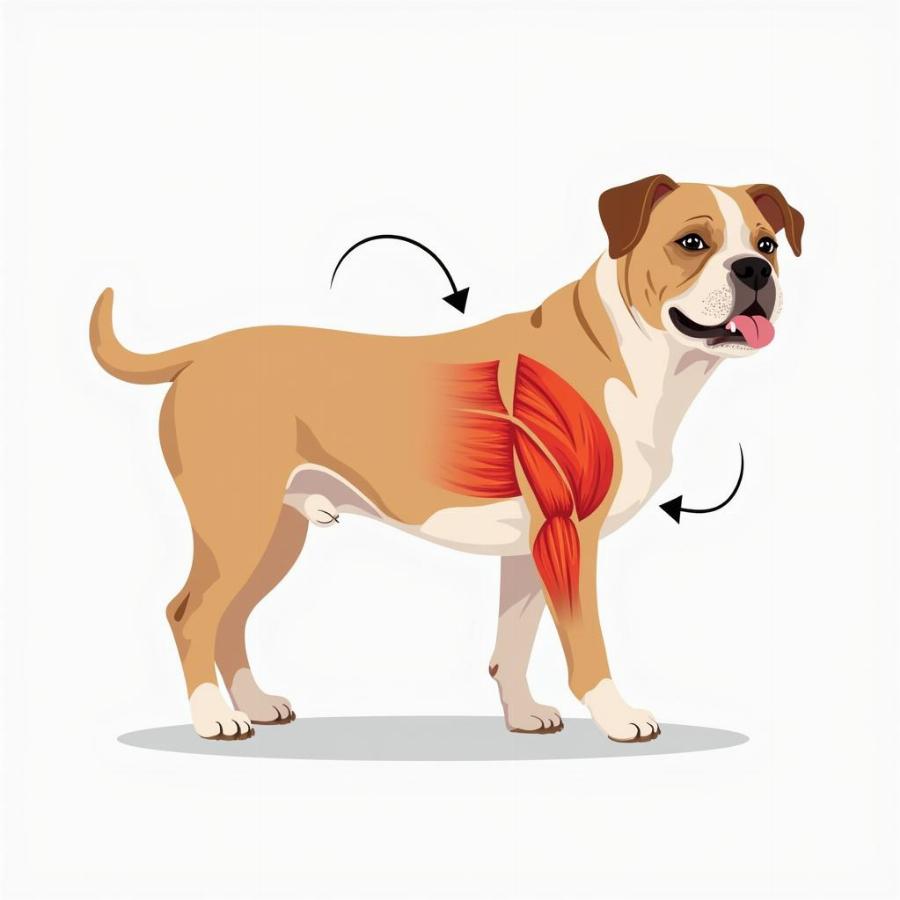The bulldog hitch, sometimes misunderstood, is a natural behavior observed in bulldogs and similar breeds. It’s characterized by a brief, involuntary spasm or tightening of the hind leg muscles, often causing the leg to extend backward momentarily. While it can look concerning, it’s generally harmless and a unique quirk of these breeds. This article delves into the causes, management, and potential concerns related to the bulldog hitch in bulldogs.
What Causes a Bulldog Hitch?
The exact cause of the bulldog hitch isn’t fully understood, but several theories exist. One prominent theory links it to a genetic predisposition, particularly in breeds with shorter legs and stockier builds. Some believe it’s related to a temporary nerve misfire or muscle spasm. Others attribute it to slight hip dysplasia or other musculoskeletal issues. Finally, some vets suspect it could be a mild form of epilepsy or related to allergies or other irritants.
 Bulldog Hitch Illustration
Bulldog Hitch Illustration
Is a Bulldog Hitch a Cause for Concern?
In most cases, a bulldog hitch is harmless and doesn’t cause pain or discomfort. It’s often described as a quick, involuntary twitch that resolves on its own. However, if the hitch is frequent, severe, or accompanied by other symptoms like limping, pain, or difficulty walking, it’s crucial to consult a veterinarian. These accompanying symptoms could indicate a more serious underlying condition requiring professional attention.
Managing a Bulldog Hitch
Since the bulldog hitch is typically benign, specific management isn’t usually necessary. However, maintaining a healthy weight for your bulldog can help reduce strain on their joints and potentially lessen the frequency or severity of hitches. Regular exercise appropriate for the breed, like short walks and playtime, is also essential for overall health.
When to Consult a Vet about Bulldog Hitch
While occasional hitches are usually nothing to worry about, certain situations warrant a veterinary visit. If you notice any of the following, schedule an appointment with your vet:
- Increased Frequency: If the hitches become more frequent or noticeable.
- Severity: If the hitches appear more pronounced or forceful.
- Accompanying Symptoms: If your bulldog exhibits other signs like limping, pain, yelping, or difficulty moving.
- Changes in Behavior: If you notice any other changes in your bulldog’s behavior alongside the hitches.
Bulldog Hitch and Quality of Life
A typical bulldog hitch rarely impacts a dog’s quality of life. Bulldogs can run, play, and enjoy their usual activities without hindrance. However, if the hitch is associated with pain or discomfort, it can understandably affect their mobility and overall well-being. This is why prompt veterinary attention is crucial in cases of severe or frequent hitches.
Conclusion
The bulldog hitch is a unique characteristic often seen in bulldogs. While generally harmless, understanding its potential causes and recognizing when to seek veterinary attention is essential for responsible bulldog ownership. By monitoring your bulldog’s health, providing appropriate care, and consulting with a veterinarian when necessary, you can ensure your bulldog enjoys a happy and healthy life.
FAQ
-
Is a bulldog hitch painful? Usually, no. Most bulldogs don’t show any signs of pain or discomfort during a hitch.
-
Can a bulldog hitch be cured? Since the cause isn’t always clear and it’s often benign, there isn’t a specific “cure.”
-
Are all bulldogs affected by the hitch? No, not all bulldogs experience this, but it’s more common in certain breeds.
-
Can diet affect the bulldog hitch? Maintaining a healthy weight can potentially lessen the strain on joints and reduce the frequency of hitches.
-
Is a bulldog hitch a sign of a serious problem? While usually harmless, frequent, severe, or accompanied hitches could indicate an underlying condition requiring veterinary attention.
-
How can I tell if my bulldog’s hitch is serious? Look for accompanying symptoms like limping, pain, or difficulty walking.
-
Should I be concerned if my bulldog only hitches occasionally? Occasional hitches are usually not a cause for concern.